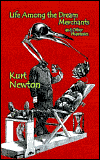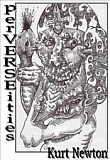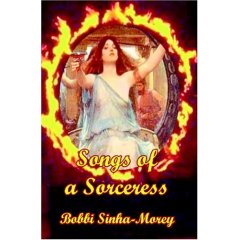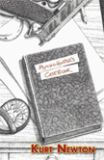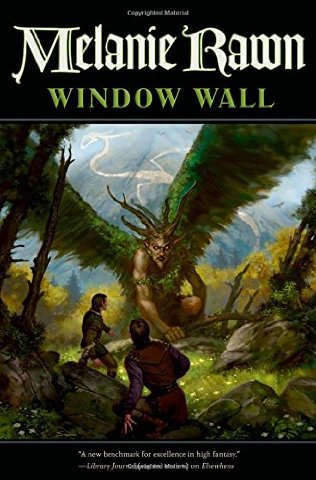
At The Orange Blossom Cafe, by Bobbi SinhaMorey
Book Review by Phillip A. Ellis
Have you read this book?
There is good and bad with the poetry of At the Orange Blossom Cafe, and there are reasons to read it, and reasons not to. First, the good.
Bobbi Sinha-Morey approaches an elegant level of Imagism with her simple, yet not simplistic, and exceedingly precise verse. There is never a wasted word, nothing superfluous. The adjectives are all strong, never weakening the lines or images, and she writes with a precision and lyricism that are, simply, breathtaking in their exactitude and effect. For example, the title poem concludes
This is a note that is almost flawless.
In addition, the speculative nature of the poems is generally very subtle, with figures such as the unnamed wiccans, wizards, priestesses interacting and dwelling with nymphs, fairies and other similar spirits. This is a lyrical world, almost animistic, and definitely pagan. It avoids the worst excesses of pagan writing, too, and it leaves the reader feeling the languidity of a pensively dreamt afternoon.
Now, to the bad.
The chief flaw with the poems is the line itself. Most are too short, too staccato. As a result, undue emphasis is placed upon the elements within the lines, more than they can or should bear. For a poem such as "Winter Fuschia", it is a vast problem, as you may gather from its opening lines:
If Bobbi were to recast the lines slightly, lengthening them to a suitable degree, the effect, the poem's ethos, as it were, would be more in concord with the words, the logos. Trying something like this might be a more suitable alternative:
Where the poems are most effective, the lines are that little bit longer, allowing the rhythms fuller play, to grow and to breathe. One such poem, in this collection, is "Woodland Fairy in the Snow", which starts:
All together, though, the poems deserve a sympathetic reading. Bobbi Sinha-Morey is a talented writer, and she deserves an audience for her poetry. With a bit more consideration for the rhythmic and technical aspects of her poetry, she should succeed admirably. Bobbi is a talent to admire, delight in, and At the Orange Blossom Cafe is an excellent start for those who wish to be acquainted with a promising young poet of talent and ability.
Bobbi Sinha-Morey approaches an elegant level of Imagism with her simple, yet not simplistic, and exceedingly precise verse. There is never a wasted word, nothing superfluous. The adjectives are all strong, never weakening the lines or images, and she writes with a precision and lyricism that are, simply, breathtaking in their exactitude and effect. For example, the title poem concludes
spin white
carnations
into Swiss
meringues
on a late
evening in
spring.
This is a note that is almost flawless.
In addition, the speculative nature of the poems is generally very subtle, with figures such as the unnamed wiccans, wizards, priestesses interacting and dwelling with nymphs, fairies and other similar spirits. This is a lyrical world, almost animistic, and definitely pagan. It avoids the worst excesses of pagan writing, too, and it leaves the reader feeling the languidity of a pensively dreamt afternoon.
Now, to the bad.
The chief flaw with the poems is the line itself. Most are too short, too staccato. As a result, undue emphasis is placed upon the elements within the lines, more than they can or should bear. For a poem such as "Winter Fuschia", it is a vast problem, as you may gather from its opening lines:
Marigolds
in the snow
born from the
tears of a
moon cloaked
in indigo
grow under
a willow
If Bobbi were to recast the lines slightly, lengthening them to a suitable degree, the effect, the poem's ethos, as it were, would be more in concord with the words, the logos. Trying something like this might be a more suitable alternative:
Marigolds in the snow
born from the tears of a
moon cloaked in indigo
grow under a willow
Where the poems are most effective, the lines are that little bit longer, allowing the rhythms fuller play, to grow and to breathe. One such poem, in this collection, is "Woodland Fairy in the Snow", which starts:
Woodland fairy sleepsAs a poet myself, I am aware that the technicalities, the craft of the poem is as important in its success as is the inspiration, the fire behind it. If Bobbi were to be as successful in this area as she is with the fire, she should succeed admirably. As At the Orange Blossom Cafe stands now, though, she needs more work to achieve outstanding excellence.
inside the petals of
an unopened white rose
keeping herself warm
while outside it snows.
All together, though, the poems deserve a sympathetic reading. Bobbi Sinha-Morey is a talented writer, and she deserves an audience for her poetry. With a bit more consideration for the rhythmic and technical aspects of her poetry, she should succeed admirably. Bobbi is a talent to admire, delight in, and At the Orange Blossom Cafe is an excellent start for those who wish to be acquainted with a promising young poet of talent and ability.
|
Click here to buy At The Orange Blossom Cafe, by Bobbi Sinha-Morey on Amazon
|
At The Orange Blossom Cafe, by Bobbi Sinha-Morey on Amazon

| More Books You Might Like |
Comment on At The Orange Blossom Cafe, by Bobbi Sinha-Morey
| Comments on At The Orange Blossom Cafe, by Bobbi Sinha-Morey |
| There are no comments on this book. |
